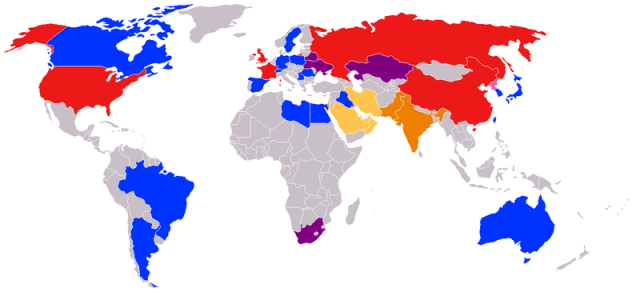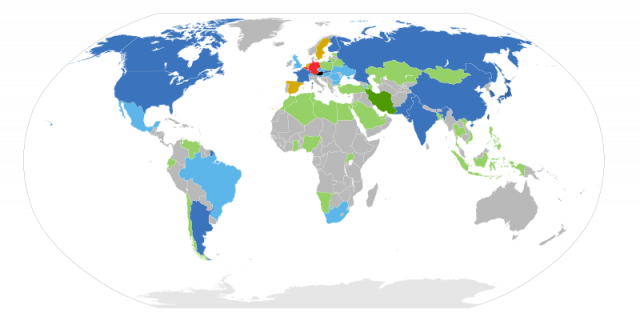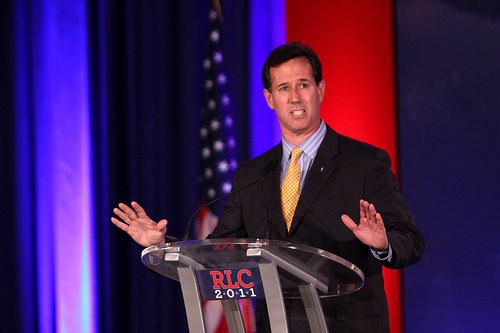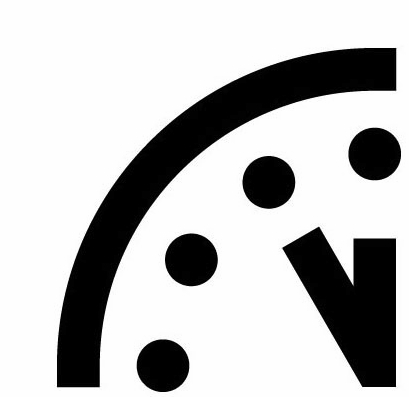
The Doomsday ClockImage courtesy of the <a href="http://www.thebulletin.org/content/doomsday-clock">Bulletin of Atomic Scientists</a>.
The Bulletin of the Atomic Scientists (BAS) moved its Doomsday Clock one minute closer to midnight on Tuesday. It now reads 11:55 p.m.
Two years ago, when it appeared that world leaders might actually address the global threats around us, the BAS ratcheted the clock backward by a minute, to 11:54pm.
Now that petite burst of optimism has dissolved.
Why?
It’s mostly about the global failure deal with climate change.
Specifically, according to the BAS:
- We’re near the point of no return in efforts to prevent catastrophic atmospheric changes
- Unless we build alternative technologies in the next five years, we’re doomed to a warmer climate, harsher weather, droughts, famine, water scarcity, rising sea levels, loss of island nations, and increasing ocean acidification
- Fossil-fuel burning power plants and infrastructure built in 2012-2020 will produce energy and emissions for 40 to 50 years
- Russia, China, India, and South Korea will likely continue to construct nuclear power plants, enrich fuel, and shape the global nuclear power industry
- Vietnam, United Arab Emirates, Turkey, and others, are still intent on acquiring civilian nuclear reactors for electricity despite the Fukushima disaster
Better news on this front:
- Solar and photovoltaic technologies are getting cheaper
- Wind turbines are being adopted commercially
- Energy conservation and efficiency are becoming accepted as sources for industrial production and residential use
- Many of these developments are taking place at municipal and local levels:
The BAS scientists note:
As we see it, the major challenge at the heart of humanity’s survival in the 21st century is how to meet energy needs for economic growth in developing and industrial countries without further damaging the climate, without exposing people to loss of health and community, and without risking further spread of nuclear weapons.
 Credit: Savantpol via Wikimedia Commons.
Credit: Savantpol via Wikimedia Commons.
Other issues worrying the BAS include nuclear disarmament:
-
The path toward a world free of nuclear weapons is not clear and leadership is failing
-
It’s still possible for radical groups to acquire and use highly enriched uranium and plutonium to wreak havoc in nuclear attacks
-
Disagreements between the US and Russia about missile defense, and insufficient cooperation among the nine nuclear weapons states is creating distrust that is leading nearly all nuclear weapons states to hedge their bets by modernizing their nuclear arsenals
-
Ambiguity about Iran’s nuclear power program continues to be the most prominent problem
-
The potential for nuclear weapons use in regional conflicts in the Middle East, Northeast Asia, and particularly in South Asia is alarming, and ongoing efforts to ease tensions, deal with extremism and terrorist acts, and reduce the role of nuclear weapons in international relations have had only halting success
 Credit: World Nuclear Association via Wikimedia Commons.
Credit: World Nuclear Association via Wikimedia Commons.
And the BAS is also concerned about nuclear energy:
- The Fukushima disaster raised significant questions needing to be addressed
- Safer nuclear reactor designs need to be developed and built, and more stringent oversight, training, and attention are needed to prevent future disasters
- A major question: How can complex systems like nuclear power stations be made less susceptible to accidents and errors in judgment?















